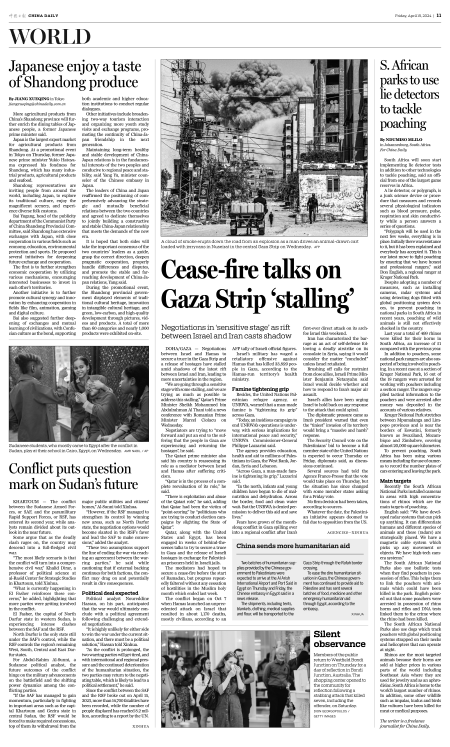
Sudanese students, who mostly came to Egypt after the conflict in Sudan, play at their school in Cairo, Egypt, on Wednesday.
KHARTOUM — The conflict between the Sudanese Armed Forces, or SAF, and the paramilitary Rapid Support Forces, or RSF, has entered its second year, while analysts remain divided about its outlook in the near future.
Some argue that as the deadly clash rages on, the country may descend into a full-fledged civil war.
"The most likely scenario is that the conflict will turn into a comprehensive civil war," Khalid Dirar, a professor of political science at al-Rasid Center for Strategic Studies in Khartoum, told Xinhua.
"What is currently happening in El Fasher reinforces these concerns," he added, highlighting that more parties were getting involved in the conflict.
El Fasher, the capital of North Darfur state in western Sudan, is experiencing intense clashes between the SAF and the RSF.
North Darfur is the only state still under the SAF's control, while the RSF controls the region's remaining West, South, Central and East Darfur states.
For Abdul-Rahim Al-Sunni, a Sudanese political analyst, the future outcomes of the conflict hinge on the military advancements on the battlefield and the shifting power dynamics among the conflicting parties.
"If the SAF has managed to gain momentum, particularly in fighting in important areas such as the capital Khartoum and Gezira state in central Sudan, the RSF would be forced to make required concessions, top of them its withdrawal from the major public utilities and citizens' homes," Al-Sunni told Xinhua.
"However, if the RSF managed to strengthen its control by winning new areas, such as North Darfur state, the negotiation options would become slanted in the RSF's favor and lead the SAF to make concessions," added the analyst.
"These two assumptions support the line of ending the war via reaching an agreement between the warring parties," he said while cautioning that if external backing continues for both factions, the conflict may drag on and potentially result in dire consequences.
Political deal expected
Political analyst Noureddine Hassan, on his part, anticipated that the war would ultimately conclude with a political agreement following challenging and extended negotiations.
"It is highly unlikely for either side to win the war under the current situation, and there must be a political solution," Hassan told Xinhua.
"As the conflict is prolonged, the two warring parties will get tired, and with international and regional pressure and the continued deterioration of the humanitarian situation, the two parties may return to the negotiating table, which is likely to lead to a political settlement," he said.
Since the conflict between the SAF and the RSF broke out on April 15,2023, more than 14,700 fatalities have been recorded, while the number of people displaced has reached 8.2 million, according to a report by the UN.

